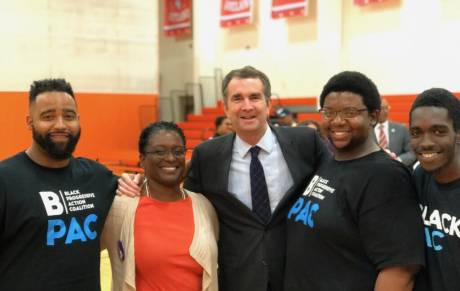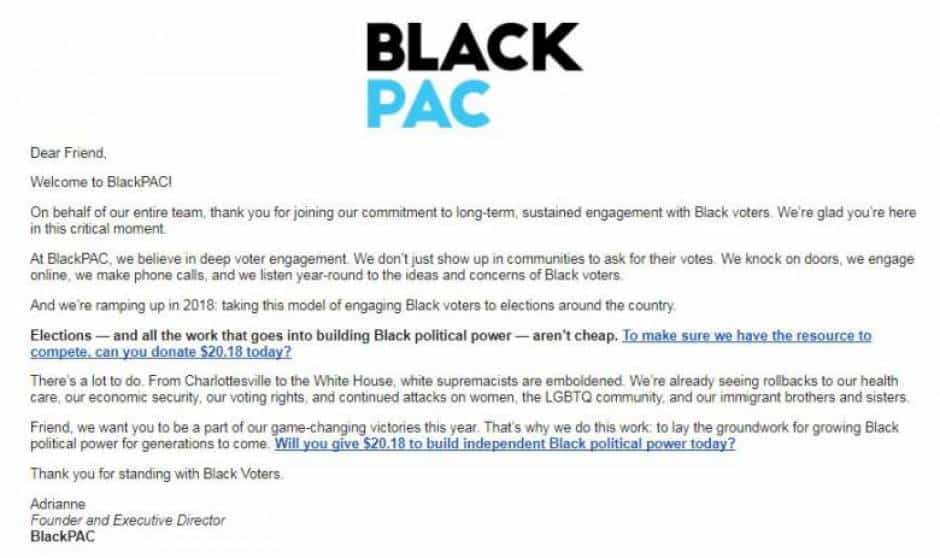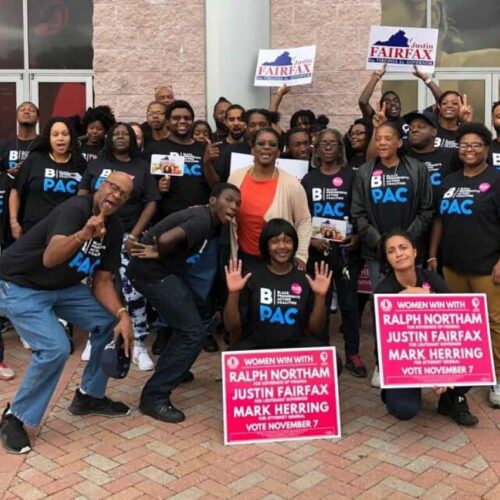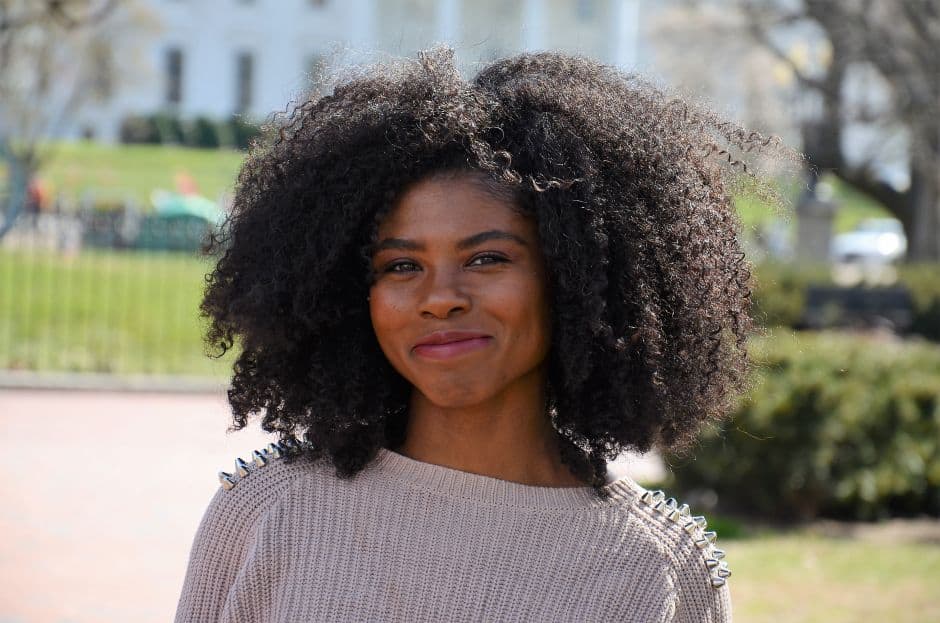Version of this article appear on NBC News and Public Radio International.
Introduction
Late last year, BlackPAC — then a little-known, liberal super PAC led by a longtime political organizer — swept into Alabama’s special U.S. Senate race and began spending hundreds of thousands of dollars to great effect.
The New York-based BlackPAC knocked on more than 520,000 doors, sent mail to 271,000 homes and made 72,000 phone calls to Alabamians. The effort helped organize black volunteers en masse, who in turn urged prospective voters to the polls.
In the end, the candidate BlackPAC backed, Democrat Doug Jones, notched one of the most notable electoral victories in modern congressional history, defeating Republican Roy Moore in a state that hadn’t elected a Democrat to the U.S. Senate since 1992. BlackPAC spent nearly $614,000 on canvassing and calls in a matter of weeks, ranking it among the biggest super PAC rainmakers in a race that attracted more than $19 million in non-candidate spending overall, including the primaries.
Avowedly anti-Donald Trump, anti-white supremacy and pro-black political power, BlackPAC is now positioning itself headed into the 2018 midterm elections as a “movement” fighting against, among other roadblocks to equality, “unchecked power” and a “corrupt campaign finance system that benefits corporations over citizens.”
But there’s another side to BlackPAC.
BlackPAC’s financial resources, for one, do not come from an army of small-dollar, “grassroots” donors in the style of a politician such as Bernie Sanders. Instead, its primary bankrollers are a coterie of well-heeled organizations with deep ties to the national Democratic Party, such as the pro-Hillary Clinton super PAC Priorities USA Action.
These groups, in turn, are funded in large part by wealthy, white men. Liberal, “dark money” nonprofit groups that don’t publicly disclose the identities of their own contributors are also among BlackPAC’s bankrollers.
Which leaves some to wonder: Is BlackPAC little more than a convenient rent-a-group for wealthy Democratic interests struggling to connect with black voters in a post-Barack Obama political era?
BlackPAC’s executive director, Adrianne Shropshire, said an upstart group such as hers can’t achieve its activist goals without a significant infusion of cash.
Shropshire, a longtime political activist and community organizer with roots in California, said building an organization dedicated to year-round voter engagement, “takes money.”

As a black woman commanding significant political resources, Shropshire herself is a rarity: Most successful super PAC leaders and funders this decade — whether conservative or liberal — are white. Entering critical 2018 midterm congressional elections, the stature of Shropshire’s super PAC, which by law may raise and spend unlimited amounts of money, may grow.
Still, some liberal activists are concerned BlackPAC’s ties to mainstream Democrats will damage its activist credentials. They’re also concerned BlackPAC’s use of “dark money” — cash that can’t be traced to a human source — to fuel its efforts undermines its stance against political campaign corruption.
Paul S. Ryan, vice president of policy and litigation for political reform group Common Cause, isn’t swayed by BlackPAC’s justification for raising money in the fashion it has.
“Voter turnout among underrepresented groups is a really important thing for democracy,” he said of BlackPAC’s mission. “But the ends don’t justify the means.”
Ryan said BlackPAC, which has a mission he personally agrees with, “is now effectively serving as a conduit of ‘dark money.’”
>> What is political ‘dark money’ — and is it bad?
Where BlackPAC gets its greenbacks
Shropshire’s path to creating BlackPAC began in the early 1990s, when, as a student at the University of Southern California, she steeped herself in liberal activism and community organizing.
Shropshire said she assumed student leadership positions in which she fought against discrimination and violence against women. After graduating in 1991 with a degree in anthropology, she interned for Los Angeles City Councilmember Mark Ridley-Thomas in the aftermath of the Rodney King trial in South Central Los Angeles, which was hit hard by subsequent rioting, she said.
Shropshire said she found herself speaking to south Los Angeles residents and the Los Angeles Police Department about police brutality, economic issues and race.
“I always say that even now I don’t know that many black organizers and political activists whose first engagement in political work didn’t begin with a campaign around police brutality,” she said.
Shropshire’s work during her 20s involved social equality activism that is at the core of BlackPAC’s mission. After her position with Ridley-Thomas, she spent 10 years working for Action for Grassroots Empowerment and Neighborhood Development Alternatives, a membership organization that now focuses on social and economic justice for black and Latino residents in Los Angeles and goes by SCOPE, or Strategic Concepts in Organizing and Policy Education.
She followed that up by working as the executive director of New York Jobs with Justice, another grassroots-centric organization focused on improving workers’ lives.
Shropshire said she has also been an adviser to donors, labor unions and foundations on base building and issue campaigns.
Shropshire created BlackPAC two years ago as Obama’s days as president were dwindling and Trump’s political fortunes were improving. BlackPAC’s office is located in a 12-story Harlem, New York, office building. Shropshire, who also serves as BlackPAC’s treasurer, says she works alongside a group of advisers and consultants, although she wouldn’t say how many.
Black voters turned out in record numbers during the 2012 presidential election — two out of three eligible voters cast ballots.
But black voter turnout declined in 2016, to less than 60 percent of eligible voters. This marked the first decline of black voting in a presidential election in 20 years, according to Pew Research. And it contributed to an outcome the vast majority of black Americans didn’t want: Trump’s defeat of Clinton. Clinton received 88 percent of the black vote in 2016, compared to Obama’s 93 percent, according to Pew.
So Shropshire and her political organizing contemporaries from across the country posed a question to themselves: How could they sustain black voter interest after Obama left the White House?
A key answer: big money.
Of the more than $5.4 million BlackPAC has raised since its founding, $1.7 million has come from the Service Employees International Union, the SEIU’s Committee on Political Education and local and regional SEIU entities. SEIU has over two million members who work in healthcare, property services and public service.
SEIU is intimately tied to mainline Democratic politics. During the 2016 election alone, it spent nearly $17 million on political advertisements advocating for Clinton and against Trump and millions more boosting liberal Senate and House candidates, according to the nonpartisan Center for Responsive Politics.
BlackPAC was “incubated” by SEIU, Shropshire said. The union continues to play a significant role in the amount of funding that BlackPAC receives. Black Americans do retain relatively strong ties to organized labor: In 2017, black workers, at 12.6 percent, had a higher rate of union membership than white, Hispanic or Asian workers, according to the U.S. Department of Labor’s Bureau of Labor Statistics.
Shropshire said SEIU has an extensive track record of supporting liberal organizations and black civic engagement. Because of this, she said, SEIU helped bring together its state and local partners to talk about how black voters could be involved in the political process. Shropshire helped to conceive and facilitate these conversations, and BlackPAC was born.
Shropshire’ strong relationship with SEIU can be traced back to 2014 when the union paid her $150,000 for “support for political advocacy.” In 2016, SEIU paid Shropshire $100,000 for “political activities” and $21,634 for her consulting.
SEIU, which didn’t respond to requests for comment, isn’t the only major BlackPAC funder with close ties to the national Democratic Party.
Liberal super PACs Senate Majority PAC (which supports Democratic U.S. Senate candidates), Priorities USA Action (the main super PAC that backed Clinton in 2016) and Women Vote! (a project of EMILY’s List, which backs Democratic women who support abortion rights), are among BlackPAC’s other top bankrollers.
A commonality among these BlackPAC backers is that they’re largely funded by wealthy, white donors.
Senate Majority PAC has, for its part, given BlackPAC $566,240 — money that comes from the fortunes of hedge funder Donald Sussman, billionaire businessman George Soros and Soros’ son, Alexander Soros, among others, according to FEC records.
>> Mystery money floods Alabama in Senate race’s final days
Senate Majority PAC, spokesman Chris Hayden said, partnered with BlackPAC in Alabama’s U.S. Senate race and spent $2 million on a voter turnout operation in partnership with BlackPAC.
“We thought it was a real opportunity to effect change in a special election,” Hayden said.
Majority Forward — a 501(c)(4) “social welfare” nonprofit organization that doesn’t disclose its donors — has given $614,000 to BlackPAC since the PAC started up, according to FEC filings. Marc Elias, former general counsel for Clinton’s presidential campaign and general counsel for the Democratic National Committee, counts Senate Majority PAC and Majority Forward among his list of clients.
Priorities USA Action’s top funders include Soros, Facebook co-founder Dustin Moskovitz and venture capitalist Jay Robert Pritzker. The super PAC, which is run by longtime Democratic Party operative Patrick McHugh, has also received millions of dollars from the Service Employees International Union, the American Federation of State, County and Municipal Employees and other trade unions and their connected political committees.
Priorities USA Action didn’t respond to requests for comment about its relationship with BlackPAC.
EMILY’s List is a PAC whose central mission is helping Democratic women who support abortion rights win office. Women Vote! paid $200,000 directly to a digital ad vendor so that BlackPAC could independently create its own ads. Women Vote! spent $5.5 million in support of Hillary Clinton that year.
BlackPAC can also count the Sixteen Thirty Fund, another 501(c)(4) “social welfare” nonprofit group, among its allies with Clinton ties.
Last year, the group, which is headed by former Clinton administration adviser and Arabella Advisors founder Eric Kessler, gave BlackPAC $225,463.
Arabella Advisors is a firm that advises foundations, philanthropists and investors on causes, such as climate change and civic engagement.
Kessler and Sixteen Thirty Fund officials didn’t respond to requests for comment.
Another 501(c)(4) nonprofit supporting BlackPAC is The Advocacy Fund, which gave BlackPAC $275,000 last year. The Advocacy Fund helps liberal donors and activists “to run high impact legislative and political campaigns by providing a legal and fiscal home,” according to its website.
While BlackPAC is primarily funded by other super PACs and “dark money” nonprofits, Shropshire, BlackPAC’s founder, says she believes “our policies should not be controlled by who has the most amount of money.”
The money that BlackPAC does receive, said Shropshire, is about those who understand expanding black political engagement and supporting BlackPAC’s agenda.
“They’re supporting our agenda — not the other way around.”
Adrianne Shropshire, BlackPAC founder
“They’re supporting our agenda — not the other way around,” she said. “Our agendas often align, but we are always very clear about who we are accountable to — Black communities — and what we stand for — fixing our rigged economic system and its predatory relationship to communities of color, ending the strategy of mass incarceration, protecting voting rights, and creating a more equitable education system; we welcome donors who share these values.”
Does the origin of political money matter?
Allies of BlackPAC have mixed feelings about its big-money fundraising strategy.
Atlanta-based Black Voters Matter Fund co-founders LaTosha Brown and Clifford Albright both credit BlackPAC with reaching black Alabamians and providing resources to pro-Jones volunteers. Black Voters Matter Fund is a newly launched nonprofit charity with a 501(c)(4) “social welfare” arm.
Brown and Albright both have concerns about how the Democratic Party has treated its black base. But neither criticized BlackPAC for being funded by wealthy, national interests.
Albright said it’s natural that BlackPAC’s source of funding comes from nonblack sources — and debatable to what extent that even matters considering that much of the money that fueled the Civil Rights Movement also came from nonblack, and often secretive sources.
“I’m a proponent that independent politics requires independent money,” he said.
There is not a Republican equivalent to BlackPAC. Telly Lovelace, a former Republican National Committee director of African American initiatives and media, said there is unlikely to be a conservative equal to BlackPAC anytime soon, either, pointing to what he considers the GOP’s lackadaisical funding of efforts to court black voters.
“It’s like they don’t care to have it [black support] or don’t think it’s important,” Lovelace said.
The Republican National Committee has been been increasing its efforts to connect with more communities of color than ever before, committee spokeswoman Blair Ellis said. The RNC has conducted more than 50 African American and urban engagement events and held a panel and viewing party for the movie Black Panther, where tax reform and local civic participation were discussed.
The RNC is also grooming black grassroots leaders through their Republican Leadership Initiative, which held a training for black pastors in Atlanta late last year.
Black Americans for a Better Future, a conservative super PAC created in 2014, appeared to be a serious GOP attempt to attract black voters. But the group thanks its continued existence largely to billionaire megadonor Robert Mercer, who is white. In late 2017, Mercer remained the super PAC’s most significant single funder, FEC records show. Black Americans for a Better Future began this year with about $105,000 in reserve.
What’s next for BlackPAC?
With rivers of national-level money flowing to BlackPAC and Woke Vote, both run by black women, it seems that Democratic funders are indeed convinced that black women are essential to Democrats’ electoral success in the 2018 midterms and beyond.

BlackPAC
Black America’s PAC, a Republican PAC founded by Alan Keyes in 1994, has raised more than $22 million since its founding. But financial support has waned this decade, and it ended 2017 with less than $80,000 in reserve, FEC disclosures indicate.
Arisha Hatch is the director of Color of Change PAC, another PAC that, like BlackPAC, targets black voters with a goal of electing liberal politicians. Color of Change PAC recently partnered with Priorities USA Action on a study, which concluded that black millennials were an untapped resource for the Democratic Party.
Hatch, who considers Shropshire of BlackPAC a close friend, said the source of money does matter in addition to the source of influence, adding that Color of Change doesn’t accept money from corporations. But, Color of Change has no policy on accepting money from “dark money” sources themselves.
“We’re fine with taking money from folks who share our values,” she said.
Color of Change can, however, say that one of its largest donors is black. Wayne Jordan, a black real estate investor and developer, contributed $100,000 in January, according to filings. Jordan and his wife Quinn were listed among the top individual contributors to candidates, parties and groups in the 2016 election cycle, giving over $2.7 million to Democrats, according to the Center for Responsive Politics.
DeJuana Thompson is a political consultant and founder of Woke Vote, a project under New Nation Rising PAC, the mission of which is to diversify voting populations in the South and Midwestern cities.
Thompson’s projects, which were based on a strategic plan she wrote to engage Alabama’s black voters, brought in more than $2 million to execute her vision. The veteran political strategist, who’s worked with Sen. Cory Booker, D-N.J., and Obama, said most people outside Washington, D.C., aren’t so concerned about where a political group’s money comes from.
“To people on the ground it’s just resources,” she said. “They don’t have the luxury to know where does this dollar comes from.”
Thompson also isn’t convinced that BlackPAC and others focused on engaging black voters should be judged on where their money is coming from.
“We, communities of color, black organizations and black vendors have been put in a space where we have to hold the ethical banner for everybody,” she said. “We are also being asked to hold up whole parties on the back of our vote.”
Instead of worrying about the origin of funds, organizations working to empower black voters should first focus on simply obtaining resources, which are often scarce, she said.
“There has to be a new imagination around resources,” she said.
Derryn Moten, chairman of history and political science at Alabama State University, a historically black school, said he, too, isn’t concerned about the origins of money for groups that do grassroots work, such as BlackPAC.
Moten said Alabama’s U.S. Senate election results show that black voters in rural areas can be just as energized as black voters in urban areas. “Those monies are necessary,” he said.
Longtime Democratic strategist Donna Brazile, while noting she’s no fan of super PACs in general, said BlackPAC is breaking the historical cycle of underfunded black political organizations.
“For decades, black political operations have been underfunded until the closing days of an election cycle. With BlackPAC and others, this has allowed major grassroots funding to invigorate grassroots mobilization,” said Brazile, chairwoman of the Democratic National Committee from mid-2016 to early 2017.
According to CNN exit polling, 94 percent of black women voted for Clinton in 2016. In Alabama’s special U.S. Senate race, 98 percent of black women voted for Jones, the Democrat.
Albright, one of the co-founders of Black Voters Matter Fund, said listening to and investing in black women is critical as progressive groups scramble to counteract the Trump era.
“If folks are in a room talking about progressive issues and there aren’t black women in the room, there is something wrong with that room,” he said.
Shropshire, BlackPAC’s leader, is certainly positioning herself as one of the black women “in the room.”
But Shropshire, despite BlackPAC’s recent increase in money and profile, isn’t well-known among some connected, left-leaning organizers and Washington, D.C., political elite.
Brazile acknowledged not being familiar with Shropshire.
Michael Collins, spokesman for civil rights icon and 16-term Rep. John Lewis, D-Ga., said Lewis had no knowledge of BlackPAC.
Some of Shropshire’s right-leaning counterparts also aren’t familiar with her. But one, Shermichael Singleton, a Republican political consultant, said he’s familiar with BlackPAC.
Curious about the group, Singleton said he made a few phone calls earlier this year to colleagues to ask about BlackPAC. But those he called “dismissed it because no one seemed to know who even operates it,” he said in an email.
Thompson, who enlisted the help of Shropshire in Alabama, heard her name through the liberal political organizing grapevine.
“The activist community who worked on engagement and politics, those of us who are practitioners of color, we typically all know each other or know the work because we’re constantly trying to lift up the opportunities that may or may not exist,” she said.
Kimberly Peeler-Allen has known Shropshire for more than five years, and she has enlisted Shropshire as a consultant when her organization, Higher Heights for America, launched in 2011.
“People don’t know her because she’s been very behind the scenes,” Peeler-Allen said. “She shies away from the limelight.”
Shropshire is clear that her connections with various liberal organizations have helped her raise money for BlackPAC. These connections have helped make BlackPAC one of the more financially supported super PACs for black people and led by black people in recent years.
“It was a no-brainer” for organizations that knew Shropshire to give BlackPAC money after Shropshire founded it, Peeler-Allen said.
BlackPAC’s agenda for energizing a collective of black voters to create a fairer political system includes plans for electing officials who are pro-criminal justice reform and serious about giving people of color better economic opportunities. BlackPAC also has its own nonprofit “social welfare” arm, Black Progressive Action Coalition, that will fulfill its vision of interacting with voters all year.
Shropshire said BlackPAC intentionally chose to create a 501(c)(4) “social welfare” because it would allow room for the organization to engage in politics to greater lengths than 501(c)(3) nonprofit status would allow.
Shropshire and other black-led organizations such as BlackPAC also see year-round voter interaction as key to connecting with prospective black voters who aren’t normally reached.
Shropshire wouldn’t provide details of the PAC’s plans for the 2018 midterm election because, she said, her team is still in the process of plotting its strategy. She did, however, say that her team has discussed revisiting places it’s been like Virginia, tapping into Georgia’s governor’s race and partnering with other 501(c)(4) organizations in the Midwest who are doing work they’ll “likely engage with.”
Both Black Voters Matter Fund co-founders and Thompson, the founder of Woke Vote, have expressed interest in working with BlackPAC.
Brown said BlackPAC is a super PAC to watch, mostly because of Shropshire.
“I’m very interested and excited about black women in these spaces,” she said. “She’s demonstrated that in many ways she’s capable and strategic.”
Brazile said BlackPAC has the opportunity to do something new in politics.
“Black politics in the post-Obama era will challenge the old political order that relied on votes without political empowerment,” she said. “BlackPAC can leverage and create more opportunities.”
Read more in Money and Democracy
Elections
Conservative ‘dark money’ group faces IRS complaint over tax filings
Watchdogs say Americans for Job Security should face federal penalties
Elections
Sinclair-related political money goes mostly to Republicans. But Democrats get cash, too
Critics argue the TV news giant is producing Trump-friendly ‘pro-government propaganda’




Join the conversation
Show Comments
Insightful. Is there data available on where the BlackPAC funds ultimately went? Is there any specific knowledge available on the percentile of funds funneled to which races, candidates, or efforts on the ground or in social media?